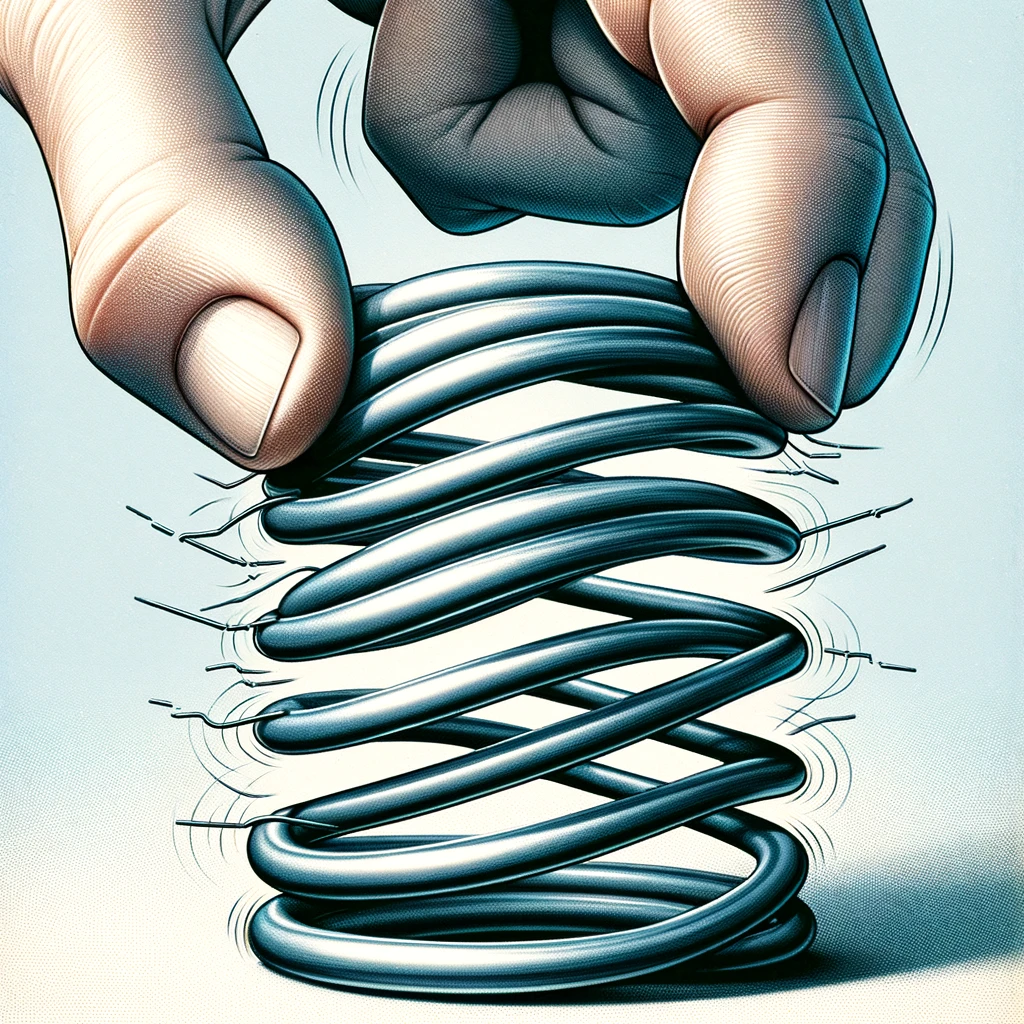Tension
Definition
Tension is a term used to describe the state of being stretched tight, either physically or emotionally. In physics, it's the force exerted on a material object to stretch or elongate it.
Parts of Speech
- Noun
- Verb (less common)
Pronunciation
American English
- IPA Pronunciation: /ˈtɛnʃən/
- Respelling: TEN-shuhn (with "TEN" as in "ten" and "shuhn" as in "cushion")
British English
- IPA Pronunciation: /ˈtɛnʃən/
- Respelling: TEN-shuhn (similar to American English, with "TEN" as in "ten" and "shuhn" like in "cushion")
In both dialects, "tension" is pronounced with the primary stress on the first syllable, "TEN." The word ends with "shuhn," which sounds like "cushion." The pronunciation of "tension" is consistent between American and British English.
Etymology
The word "tension" derives from the Latin word tensio, which originates from tensus, the past participle of tendere meaning to stretch.
Derivatives
- Tensional (adjective)
- Tensionless (adjective)
- Detension (verb)
- Hypertension (noun)
- Pretension (noun)
Synonyms
- Strain
- Stress
- Tightness
Antonyms
- Relaxation
- Slackness
- Loose
Usage
Tension can be used in various contexts including in describing emotional states, physical states, or forces in physics.
Related Terms
- Surface tension
- Tension force
- Tension headache
Detailed Definition
Noun
- Physical State: The state of being stretched tight, often referring to materials or muscles.
- Example: The tension of the rope must be checked before the climb.
- Emotional State: Mental or emotional strain, suspense, anxiety or stress.
- Example: There was a lot of tension in the room as they awaited the test results.
- Physics: A force that tends to stretch or elongate something.
- Example: The tension in the cable supports the suspension bridge.
Verb (less common)
- To Apply Force: To apply a force to (something) causing it to stretch.
- Example: He needed to tension the cables to ensure stability.
tension



🇨🇳 Mandarin
- 张力 (zhāng lì) - Mechanical tension
- IPA: /ʈ͡ʂaŋ˥ li˥˩/
- Respelling: zhang lee
- 紧张 (jǐn zhāng) - Nervous tension
- IPA: /t͡ɕin˨˩˦ ʈ͡ʂaŋ˥/
- Respelling: jin zhang
🇮🇳 Hindi
- तनाव (tanāv) - Stress or strain
- IPA: /təˈnaːʋ/
- Respelling: ta-naav
🇪🇸 Spanish
- Tensión - Mechanical or electrical tension
- IPA: /tenˈsion/
- Respelling: ten-see-on
- Estrés - Psychological stress
- IPA: /esˈtres/
- Respelling: es-tres
🇫🇷 French
- Tension - Mechanical or electrical tension
- IPA: /tɑ̃sjɔ̃/
- Respelling: tahn-syon
- Stress - Psychological stress
- IPA: /stʁɛs/
- Respelling: stres
🇸🇦 Modern Standard Arabic
- توتر (tawtur) - Mechanical or psychological tension
- IPA: /tawtir/
- Respelling: taw-tur
🇧🇩 Bengali
- টেনশন (ṭenśan) - General term for tension
- IPA: /ʈenʃɔn/
- Respelling: ten-shon
🇷🇺 Russian
- Напряжение (Napryazheniye) - Mechanical or electrical tension
- IPA: /nɐˈprʲæʐənʲɪje/
- Respelling: na-prya-zhe-ni-ye
- Стресс (Stress) - Psychological stress
- IPA: /strʲes/
- Respelling: stres
🇵🇹 Portuguese
- Tensão - Mechanical or electrical tension
- IPA: /tẽˈsɐ̃w̃/
- Respelling: ten-saum
- Estresse - Psychological stress
- IPA: /esˈtɾesi/
- Respelling: es-tre-se
🇮🇩 Indonesian
- Tegangan - Mechanical or electrical tension
- IPA: /təˈɡaŋan/
- Respelling: te-gan-gan
- Stres - Psychological stress
- IPA: /stres/
- Respelling: stres
🇩🇪 German
- Spannung - Mechanical or electrical tension
- IPA: /ˈʃpaːnʊŋ/
- Respelling: shpaan-ung
- Stress - Psychological stress
- IPA: /ʃtʁɛs/
- Respelling: shtres
🇯🇵 Japanese
- 張力 (Chōryoku) - Mechanical tension
- IPA: /t͡ɕoːɾʲokɯ̟ᵝ/
- Respelling: cho-ryo-ku
- ストレス (Sutoresu) - Psychological stress
- IPA: /su͍toresɯ̟ᵝ/
- Respelling: su-to-re-su
🇻🇳 Vietnamese
- Lực căng - Mechanical tension
- IPA: /lʊk˧ˀ˨ʔ kaŋ˧ˀ˨ʔ/
- Respelling: luk kang
- Căng thẳng - Psychological tension
- IPA: /kaŋ˧ˀ˨ʔ tʰaŋ˧ˀ˨ʔ/
- Respelling: kang thang
🇰🇷 Korean
- 긴장력 (ginjangryeok) - Mechanical tension
- IPA: /kʲind͡ʑaŋɾjʌk̚/
- Respelling: gin-jang-ryeok
- 스트레스 (seuteureseu) - Psychological stress
- IPA: /sʰt͡ɕʰɯːtʰɾesʰɯ/
- Respelling: seu-teu-re-seu
🇹🇷 Turkish
- Gerilim - Mechanical or electrical tension
- IPA: /ɟeˈrilim/
- Respelling: gye-ri-lim
- Stres - Psychological stress
- IPA: /stres/
- Respelling: stres
🇵🇰 Urdu
- تناؤ (tanāo) - Mechanical or psychological tension
- IPA: /təˈnaː.oʊ/
- Respelling: ta-nao





